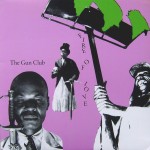Bambara : Stray

You can be an explosive, dynamic live artist with an emphasis on intensity and presence. Or you can be a thoughtful and nuanced songwriter, exploring subtle ironies and quietly devastating emotional narratives. But rare is the band who can successfully balance both: All those clever turns of phrase tend to get lost when you’re dodging elbows in the pit. That doesn’t mean you can’t; Nick Cave’s been embodying the menace and charm of the devilish figure in “Red Right Hand” onstage for decades, personifying the figures in his songs rather than just reciting them—it’s the difference between being a songwriter and being a performer.
Bambara are another such band, relative newcomers when compared to a four-decade veteran like Cave, though the New York post-punks have a solid decade of sharpening and refining their punk-blues menace to its most dangerous. In front of an audience, vocalist Reid Bateh contorts his body into impossible shapes, slams himself against the stage and obliterates the manufactured cool of the so-called “post-punk revival” in favor of something more visceral and, at times, scary. They’re an utterly captivating live band, which threatens to overshadow, gothic storytelling on albums like 2018’s Shadow On Everything and its follow-up, Stray. Or at least it would, if the harrowing tales within these songs weren’t so chilling in and of themselves.
Stray in large part follows a similar path as its predecessor, its 10 songs driven by pure adrenaline, Duane Eddy-on-methamphetamines guitar riffs and the ominous whoosh of Twin Peaks sound design. It’s music that’s meant to set the pulse racing and invite in a kind of darkness that lies just beyond your comfort zone. As much as Bambara’s intent is to push the lever forward until the needle’s all the way to the red—both in terms of their music’s abrasive immediacy and the ghastly violence that permeates their vision of Americana—they’re remarkably adept at making it all sound cool as fuck. The rhythmic strut and horn section bursts of opening track “Miracle” reveal the band as haunting in their restrained moments as they are in their most aggressive.
The narratives that propel these songs are a blend of noir and surrealist horror, the figures at the center of these songs finding trouble as often as they seek it out. The album’s searing first single, “Serafina,” sounds something like The Gun Club covering “Ace of Spades”—which practically comes fitted with its own pair of leather pants—its title character a hellraiser with “gasoline in her hair” that seems to laugh at death itself: “They sing ‘We’ll never die…We’ll burn and cry/We’ll never die.’” Death, naturally, is a character on this album as well, and on “Death Croons,” he charmingly goes against type: “Death orders a drink—’Something pink, with cherries and a sugar rim’.” And violence in this world is inevitable; over a bass-heavy gallop on “Ben & Lily,” Bateh paints a grim portrait of the title characters’ fates, singing, “Ben said, “I don’t mind he shot me/If I’m being honest, I deserved it/But what he did to my sweet Lily/She don’t deserve that one bit.”
The nightmarish, often darkly, humorously ironic narrative style that drives these songs makes for a gut-wrenching listening experience, though they might seem out of place on a more subdued or gentle album. Bloodthirsty yarns demand bloodthirsty sounds, and Stray is as ferocious—and fun—as Bambara have ever sounded. Just as an album that promises a wild night out with Death should be.
Label: Wharf Cat
Year: 2020
Similar Albums:
 Iceage – Beyondless
Iceage – Beyondless
 Protomartyr – Relatives in Descent
Protomartyr – Relatives in Descent
 Gun Club – Fire of Love
Gun Club – Fire of Love
Jeff Terich is the founder and editor of Treble. He's been writing about music for 20 years and has been published at American Songwriter, Bandcamp Daily, Reverb, Spin, Stereogum, uDiscoverMusic, VinylMePlease and some others that he's forgetting right now. He's still not tired of it.

